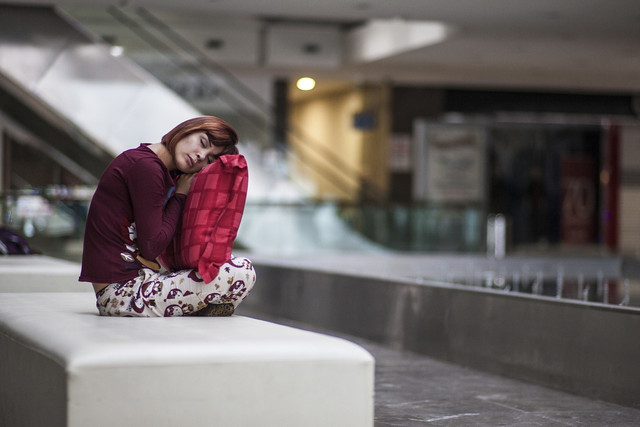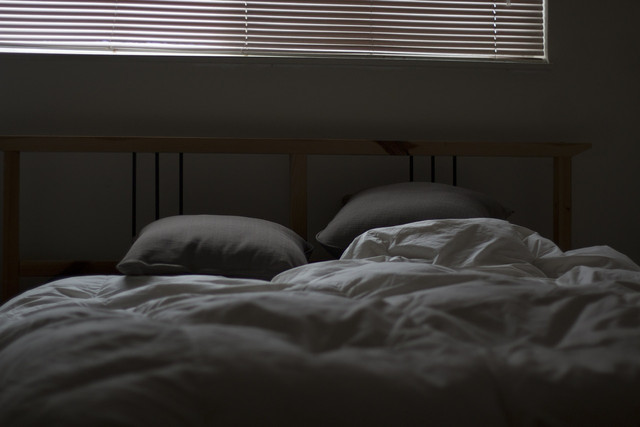
You toss and turn restlessly in bed for hours: Insomnia is a real torture. We’ll tell you how you can finally find rest at night.
It’s getting later and later. In a few hours the alarm clock will ring and you still haven’t fallen asleep: sleep is extremely important to us because it strengthens our immune system. If we sleep too little, we are unfocused and more irritable than normal. It is much harder for us to cope with everyday life than usual.
Blood pressure, hormones and metabolism can also get mixed up. In severe cases, sleep disturbances can even lead to cardiac arrhythmia. But why can we sleep so badly so often?
Note: If you do not fall asleep several times a week for more than three months, or if you wake up too early, you should seek medical advice. See also: “Natural sleep” myth: Doctors clear up misconceptions.
Causes of insomnia

(Photo: CC0 / Pixabay / Engin_Akyurt)
- Often it is due to the sleeping environment. Due to noise and light, for example from the street, sleep can be disturbed or it is difficult to fall asleep.
- Irregular bedtimes or shift work can also lead to sleep disorders. Our body lacks the continuous rhythm.
- Long brooding, triggered by worries and hardships such as depressive moods, releases stress hormones and we can’t calm down.
- Stimulants such as coffee, alcohol and nicotine can reduce the quality of sleep. We often fall asleep faster after drinking alcohol. But we sleep much more restlessly than when sober and are hardly recovered the next morning. Coffee late at night only pushes us again. Nicotine also wakes you up.
- It’s hard to imagine life without them, but they often rob us of our sleep: cell phones and laptops. Their bluish light is generated by light-emitting diodes. This brightness wakes us up again in the late evening.
- Diseases such as heart and circulatory problems, problems with the thyroid gland or arthritis can also cause sleep disorders.
You can do this to prevent insomnia

(Photo: CC0 / Pixabay / Free Photos)
- To find out why you suffer from insomnia, you can keep a sleep diary. By tracking when, how many hours, and how you slept, you can get a clue as to what’s robbing you of sleep.
- Try to establish an evening routine before bed. This can include a regular daily routine, only light meals in the evening and a comfortable bedroom. Going to bed at the same time every day also helps.
-
Air out before bed. This ensures a better indoor climate and it is easier to relax.
-
Meditation and relaxation exercises can help with insomnia. A research team from the University of Los Angeles even demonstrated the positive effect of mindfulness meditation. One explanation given by the scientists for this is that the subjects were distracted from their musings by the meditation. You can find out how meditation works here. But many apps also help to learn to meditate.
- Healthy sleep starts with a bed in which we feel comfortable. Since sleep is so important, we should not skimp on the quality of the mattress. Cotton bedding is also better for sleep than artificial fibers. If we cover ourselves with cotton, the skin can breathe better. This is not the case with bedding made of plastic and we sweat more often when we sleep.
- Get a good workout during the day or a walk in the afternoon. However, you should avoid exercising late at night, as this will get your circulation going again and wake you up.
- Natural sleeping pills such as valerian relieve nervousness and help with insomnia. The substances in the valerian root interact with our nerve cells. This can have a relaxing effect – but only with regular use.
- Don’t toss and turn in bed restlessly for hours. If you wake up in the middle of the night and haven’t fallen asleep again after a while, you should get up for a moment, read a few pages in a book or write down the thoughts that keep you from falling asleep.
- Avoid checking the clock or alarm clock at night. This will only build up more pressure and worsen the insomnia.
- If nothing helps and your insomnia persists for a longer period of time, you should seek medical advice and possibly even have yourself examined. Maybe a visit to the sleep laboratory can help you.
Read more on Techzle.com:
- 12 common mistakes that make you sleep less well in the heat
- Sleeping aid: practical tips to fall asleep faster
- Morning routine: 10 tips for a relaxed start to the day
- Lemon Balm Tea: Tasty and healthy
- Lavender tea: effect and how to make it yourself